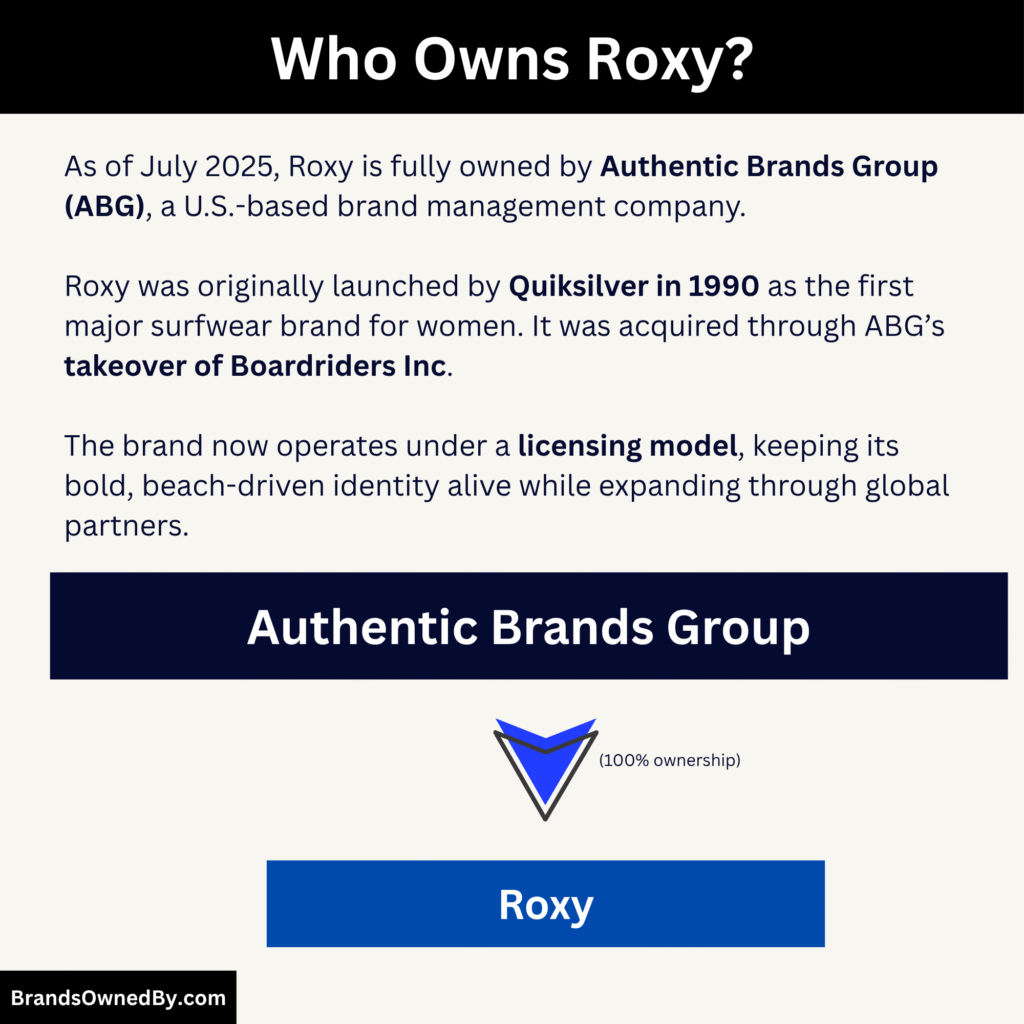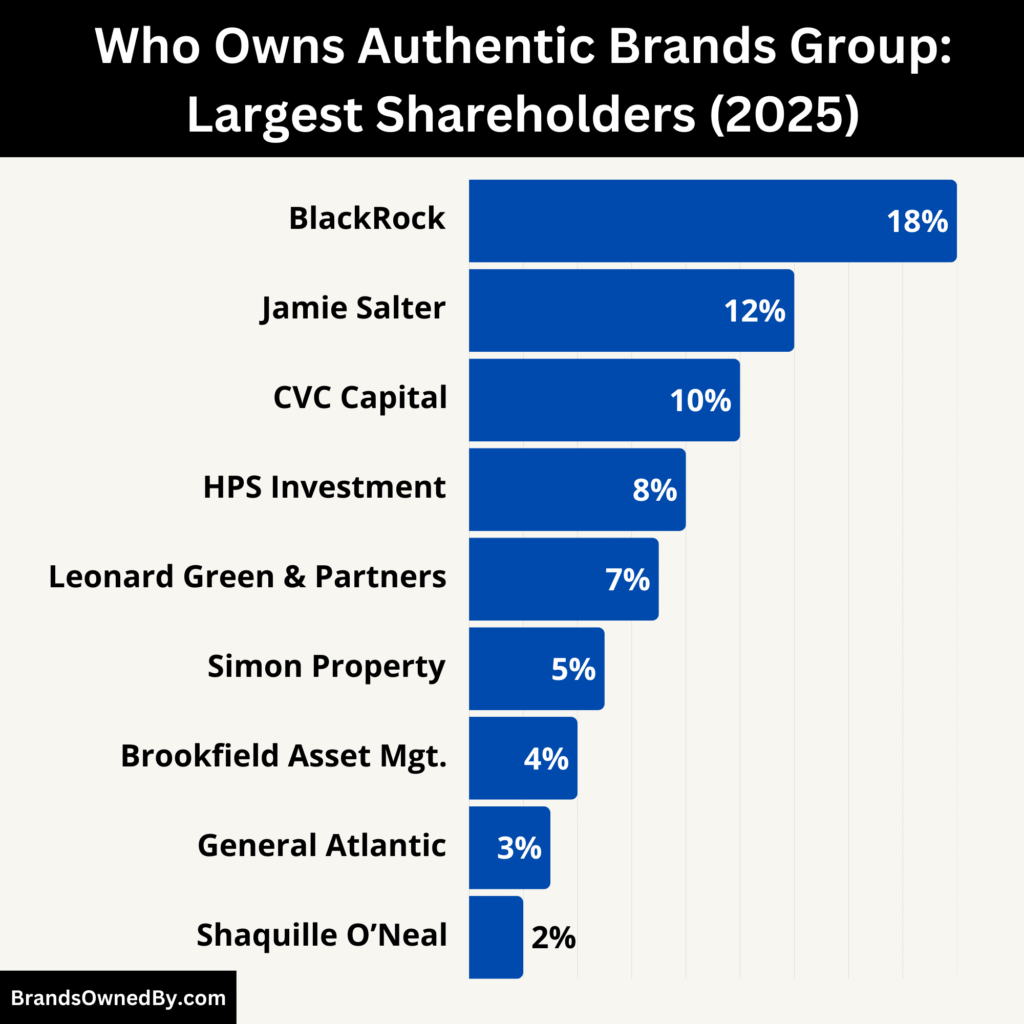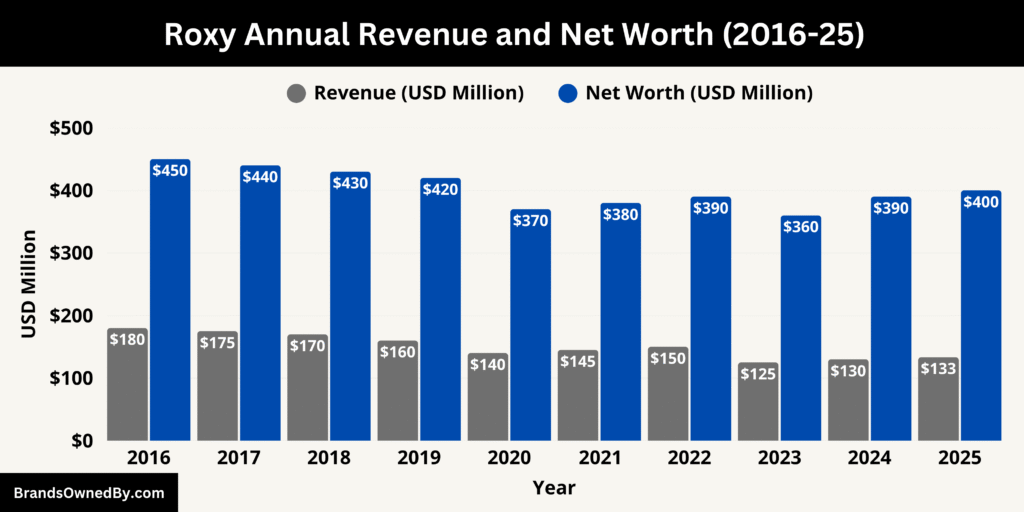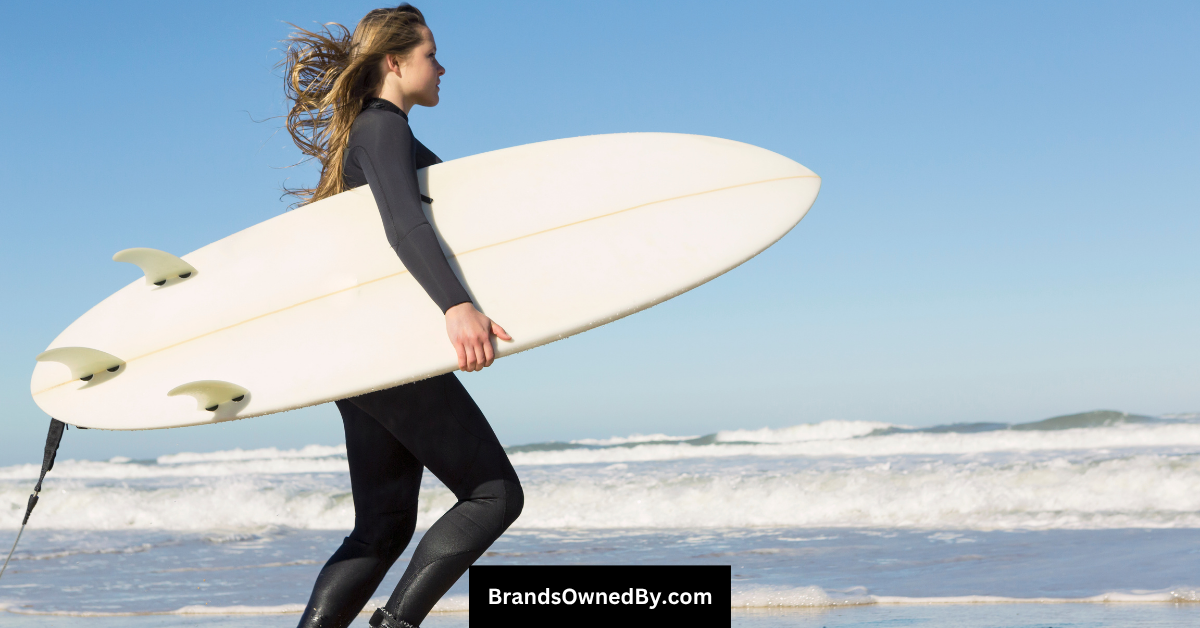Roxy is a well-known brand in the world of surf, snow, and activewear, especially among women. Many people wonder who owns Roxy and how it fits into the larger corporate landscape. This article uncovers Roxy’s ownership, its parent company, and the major shareholders behind the brand.
Roxy Company Profile
Roxy remains a leading women’s surf and snow lifestyle brand. It blends bold style with performance gear. Owned by Authentic Brands Group via Boardriders, it enjoys global recognition and cultural impact. The brand continues to serve adventurous women across surfing, snowboarding, fitness, and leisure.
Company Details
Roxy was founded in 1990 in Huntington Beach, California, as the female counterpart to Quiksilver. It operates under Boardriders, Inc., the action-sports conglomerate. In 2023, ABG acquired Boardriders for approximately $1.25 billion, making Roxy part of a massive global brand portfolio.
In 2025, Roxy employs around 400 people and generates estimated revenues of $130–$135 million.
The brand sells swimwear, outerwear, snow gear, fitness apparel, accessories, and footwear. Its online store, roxy.com, brings in roughly $22 million in e-commerce sales per year, mostly in the US. Average monthly website traffic has been in the hundreds of thousands, with strong user engagement.
Founders
Roxy was conceived by Quiksilver executives to fill a gap in women’s surfwear. The core founders include Bob McKnight and Danny Kwock, who relaunched the brand in 1992 after a brief hiatus. Its name and iconic heart-shaped logo (based on the Quiksilver wave) solidified its distinct identity by 1993–94 as a female-first surf and snow label.
Major Milestones
- 1990 – Roxy launches as a sister brand to Quiksilver.
- 1993–94 – Introduces heart logo; signs surfer Lisa Andersen, who then wins world titles.
- 1997–98 – Becomes a force in women’s surf; expands to snow gear.
- 2010 – Torah Bright wins Olympic snowboarding gold for Roxy.
- 2015–17 – Launches fitness collections, global events, and strengthens market presence.
- 2018 – Roxy participates in major campaigns like “Make Waves Move Mountains”.
- 2018 – Boardriders acquires Billabong under the parent company.
- 2023 – Authentic Brands Group completes acquisition of Boardriders (incl. Roxy) for ~$1.25 billion.
- 2025 – Strategic licensing reshapes Roxy’s global footprint amid retail partner transitions after Liberated Brands bankruptcy.
Current Company Focus
Roxy now emphasizes sustainability, female empowerment, and community building. It continues sponsoring athletes and expanding globally through ABG’s licensing network in Australia, Europe, North America, and Asia.
In 2025, new retail partnerships include Caprice Australia’s BR South Pacific for the Oceania region and Beaumanoir in Western Europe.
Roxy’s digital presence remains strong, with a focus on omnichannel growth: e-commerce, shop-in-shops, wholesale, and owned stores in Asia and Europe.
Who Owns Roxy?

Roxy is currently owned by Authentic Brands Group (ABG), a brand development, marketing, and entertainment company headquartered in New York. ABG specializes in acquiring and managing well-known global brands and has built one of the largest portfolios of fashion, lifestyle, and entertainment properties in the world.
Roxy became part of ABG’s brand portfolio in 2023 following the acquisition of Boardriders, Inc., the former parent company of Roxy, Quiksilver, Billabong, DC Shoes, and others. This acquisition significantly expanded ABG’s footprint in the global surf, skate, and snow market segments.
Parent Company: Authentic Brands Group

Authentic Brands Group was founded in 2010 by Jamie Salter, who continues to serve as its CEO. ABG owns over 50 major consumer brands, including Reebok, Forever 21, Nautica, and Juicy Couture.
The company operates using a licensing model, allowing it to partner with regional or category-specific operators while controlling brand strategy and global identity.
ABG does not typically run its brands directly. Instead, it licenses brand rights to third parties—distributors, manufacturers, and retailers—who handle production and retail. This licensing model allows ABG to scale globally while minimizing operational costs. Roxy now functions within this framework.
The Acquisition of Boardriders
In early 2023, ABG signed a definitive agreement to acquire Boardriders, Inc. in a deal reportedly valued at approximately $1.25 billion. The deal included all of Boardriders’ brands—Roxy, Quiksilver, Billabong, DC Shoes, RVCA, and others.
The acquisition closed in September 2023, making ABG the official owner of Roxy and its sibling brands. At the time of the acquisition, Boardriders had a global network of 500+ stores and wholesale accounts across over 100 countries.
Following the acquisition, ABG transitioned the brands—including Roxy—to a licensing model, assigning specific geographic and category rights to different partners. For example, Beaumanoir Group took over distribution in Europe, BR South Pacific (owned by Caprice Australia) assumed control in Australia and New Zealand, and Liberated Brands initially managed North American operations until filing for bankruptcy in 2024.
Impact of the Ownership Change
ABG’s acquisition of Roxy marked a major strategic shift. Previously, Roxy operated under the traditional vertically integrated model through Boardriders. Post-acquisition, the focus turned to licensing, digital expansion, and global scalability.
The licensing deals resulted in increased brand exposure across new territories and e-commerce channels. However, the transition also led to supply chain restructures, retail store consolidations, and changes in executive management.
In 2024, Liberated Brands, a key ABG licensee in the U.S., filed for bankruptcy, which caused temporary disruptions in Roxy’s North American operations. ABG has since reassigned licensing rights in the U.S. and continues to stabilize operations under new partners.
Current Ownership Structure
ABG is a privately held company. Its ownership is shared among institutional investors and private equity firms. Key shareholders include:
- Jamie Salter – Founder and CEO; retains a significant ownership stake and leads the company’s strategic decisions.
- BlackRock – A major asset management firm holding a substantial minority stake.
- General Atlantic – A growth equity investor with influence over global expansion strategies.
- Leonard Green & Partners – A private equity firm with a controlling interest in ABG.
Together, these shareholders oversee the decision-making and licensing strategy of ABG, including Roxy’s direction and brand development.
Roxy, under ABG, continues to thrive through international partnerships, athlete sponsorships, and a strong commitment to women’s action sports culture.
Who is the CEO of Roxy?
Roxy does not have its own dedicated CEO. Instead, it operates under the leadership of Jamie Salter, who serves as Founder, Chairman, and CEO of Authentic Brands Group (ABG)—Roxy’s ultimate parent company.
About Jamie Salter
Jamie Salter is a Canadian-born entrepreneur (born 1962/63) with deep experience in retail and brand licensing. He founded ABG in 2010 after leading Hilco Consumer Capital and co-founding Ride Inc., a snowboard company that went public in 1994.
Achievements under Salter
Salter transformed ABG into one of the world’s largest brand licensing firms. As of 2025, the ABG portfolio generates over $32 billion in annual global retail sales. He has executed more than $35 billion in brand investment deals, including marquee acquisitions like Juicy Couture, Aéropostale, Reebok, and most recently, Boardriders (including Roxy) for roughly $1.25 billion.
Leadership Style and Vision
Salter leads with a decentralized licensing model. He focuses on identifying undervalued or struggling brands and scaling them globally via partnerships rather than running manufacturing or retail directly.
He also emphasizes regional expansion, particularly in Asia-Pacific. In 2025, ABG opened a new Asia-Pacific HQ in Shanghai under his direction.
Succession Planning
Salter remains deeply involved in leading ABG and its brands. His four sons, including Corey Salter (COO), are actively involved in the business. He has discussed a future public offering (IPO) and has previously indicated ABG is “too big to stay private”.
Brand-Level Leadership: Roxy Under ABG
After ABG’s acquisition of Boardriders (including Roxy) in September 2023, Roxy transitioned from being part of a traditional corporate brand hierarchy to operating under ABG’s license-based structure.
Management Structure
Roxy is managed by a Global Brand Management Team overseen by ABG-appointed brand presidents and general managers. These teams handle design, marketing, athlete partnerships, and product strategy—while ABG retains control over licensing, brand direction, and global strategy.
One of the key figures is Émilie Souvras, former Global Brand General Manager for Roxy under Boardriders, who led product and retail expansion before moving to a broader role within ABG.
Retail operations in Europe, Oceania, and North America are handled by localized licensees. For example:
- Beaumanoir Group leads Western Europe
- BR South Pacific handles Australia and New Zealand
- Licensing in North America has been restructured following the 2024 bankruptcy of Liberated Brands
ABG continues to oversee the broader network and ensures brand consistency across regions.
CEO Legacy at Boardriders
Before ABG’s acquisition, Roxy’s parent company Boardriders had its own CEOs:
- Pierre Agnès (2015–2018): Served as CEO but tragically died in 2018 after a boating incident.
- Dave Tanner (2018–2023): Took over as CEO after Agnès’s disappearance and led the company through its acquisition of Billabong and eventual sale to ABG.
- Arne Arens (2023–?): Identified as CEO via corporate data, possibly appointed during or after the ABG acquisition, though oversight shifted to ABG and Salter.
Roxy Annual Revenue and Net Worth

In 2025, Roxy’s global revenue is estimated at $133.4 million, generated by its diversified product lines—ranging from swimwear and snow apparel to accessories and footwear. Much of this revenue stems from its online store, roxy.com, which alone saw gross sales of approximately $21.9–22 million in 2024.
Monthly e‑commerce sales hover around $2 million, showing seasonal fluctuations but stable year-over-year performance. The brand’s broader retail and wholesale channels, managed through licensing agreements, further contribute to its top-line, particularly across markets in North America, Europe, and Asia-Pacific.
Roxy Net Worth and Brand Valuation
As of July 2025, Roxy’s net worth, based on brand equity and market position, is estimated in the range of $400 to $600 million. This valuation accounts for its strong global recognition, dedicated female athlete community, and revenue stability. Contributing factors include strategic licensing, sustained consumer demand in action-sports apparel, and upstream support from Authentic Brands Group.
Roxy’s licensing model has significantly strengthened its valuation. With ABG-centric global agreements, the brand benefits from retail exposure in 100+ countries—without carrying major operational burdens like direct manufacturing or inventory risk. This asset-light approach enhances profitability, cash flow stability, and brand scalability.
Here is an overview of Roxy’s estimated revenue and brand net worth over the past 10 years (2016–2025):
| Year | Estimated Revenue (USD) | Estimated Net Worth (USD) |
|---|---|---|
| 2016 | $180 million | $450 million |
| 2017 | $175 million | $440 million |
| 2018 | $170 million | $430 million |
| 2019 | $160 million | $420 million |
| 2020 | $140 million | $370 million |
| 2021 | $145 million | $380 million |
| 2022 | $150 million | $390 million |
| 2023 | $125 million | $360 million |
| 2024 | $130 million | $390 million |
| 2025 | $133.4 million | $400–600 million |
Context within Authentic Brands Group
Authentic Brands Group, the owner of Roxy, reported $106.9 million in licensing and royalty revenue in 2025. While this is separate from retail sales—ABG’s combined brand revenue exceeded $27 billion, driven by portfolio-wide retail activity. Roxy is one of ABG’s most valuable youth- and active-sports brands. Its consistent revenue and strong net worth bolster ABG’s balance sheet and global licensing strategy.
Under ABG’s sponsorship, Roxy has expanded into new territories and product categories, reinforcing its value and contributing to the overall brand equity portfolio. The brand’s blend of physical retail, e‑commerce traction, and partnerships has helped maintain its healthy revenue run and strong valuation in 2025.
Brands Owned by Roxy
Roxy doesn’t own brands but it operates sub-brands and categories within its brand. Here’s a list of the major brands and sub-brands owned by Roxy as of 2025:
| Sub-Brand / Category | Description | Target Audience | Product Focus |
|---|---|---|---|
| Roxy Girl | Youth-focused line offering surf and lifestyle apparel for girls | Girls aged 7–16 | Swimwear, apparel, accessories |
| Roxy Fitness | Activewear and workout gear designed for movement and performance | Women and teen girls | Leggings, sports bras, tops, yoga wear |
| Roxy Snow | Winter sports line offering technical gear and fashion for snowboarding and cold climates | Female snowboarders and outdoor enthusiasts | Snow jackets, pants, thermals, snowboards, goggles |
| Roxy Swim | Core collection of surf-inspired swimwear | Women and girls | Bikinis, one-pieces, rash guards, surf suits |
| Roxy Footwear | Footwear line supporting beachwear and lifestyle segments | Women and girls | Flip-flops, sandals, water shoes, casual boots |
| Roxy Accessories | Fashion and utility accessories tied to seasonal apparel collections | All ages | Bags, backpacks, towels, sunglasses, hats |
| Roxy Fragrance & Beauty | Limited-edition body products and fragrance campaigns | Teen girls and young women | Perfumes, body mists, bath products |
| Capsule Collections & Collaborations | Exclusive, themed collections with athletes and artists | Niche lifestyle audiences and fans | Eco-friendly wear, signature lines, athlete collabs |
Roxy Girl
Roxy Girl is Roxy’s youth and teen-focused segment. It offers apparel, swimwear, and accessories designed specifically for young girls, typically ages 7 to 16. The styles are colorful, energetic, and often aligned with junior surf and snow culture. Roxy Girl emphasizes both activewear and lifestyle fashion for the next generation of female athletes.
Roxy Fitness
Roxy Fitness is a growing category that covers workout apparel, yoga wear, sports bras, leggings, and performance gear. It reflects the brand’s push into active lifestyle markets beyond surfing and snowboarding. Roxy Fitness focuses on comfort, stretchable materials, sweat-wicking fabrics, and fashionable designs made for everyday training, wellness, and movement.
Roxy Snow
Roxy Snow is Roxy’s line of snowboarding outerwear, gear, and accessories for winter sports. This includes snow jackets, pants, thermals, base layers, gloves, goggles, and technical snowboards. Roxy Snow caters to performance athletes and recreational snow lovers, with products engineered for warmth, waterproofing, and flexibility.
Roxy Swim
Roxy’s Swim category is one of its core segments. It features bikinis, one-pieces, rash guards, and surf suits designed for comfort and functionality in water sports. Roxy Swim blends athletic performance with feminine design, making it one of the brand’s most recognized and successful product lines globally.
Roxy Footwear
This line covers casual sandals, flip-flops, water shoes, boots, and seasonal footwear. Designed for both lifestyle and function, Roxy footwear complements the apparel collections and is aimed at both beachwear and everyday wear for women and girls.
Roxy Accessories
Roxy’s accessories segment includes backpacks, bags, beach towels, hats, beanies, sunglasses, water bottles, watches, and snow gear accessories. These items are frequently designed to match seasonal apparel collections and are integral to completing the Roxy look.
Roxy Fragrance and Beauty
Though limited, Roxy has released branded fragrances and beauty products under its name. These often include perfumes, scented body mists, and bath items. They are typically distributed as part of gift sets or seasonal promotional campaigns and are targeted at the youth market.
Limited Collaborations and Capsule Collections
While not formal sub-brands, Roxy occasionally creates limited-time capsule collections with athletes, designers, or influencers. These collaborations may highlight eco-conscious materials, artist prints, or campaign-based themes like empowerment or sustainability. Examples include collections inspired by Olympic snowboarders or sponsored surfers.
Final Thoughts
Roxy is no longer just a surf brand. It is a global lifestyle label catering to active women. Now owned by Authentic Brands Group through the acquisition of Boardriders, Roxy continues to thrive under experienced leadership and strong investment backing. Its connection to other iconic brands within ABG’s portfolio allows it to scale and adapt in a changing market.
FAQs
Who owns the Roxy brand?
As of 2025, the Roxy brand is owned by Authentic Brands Group (ABG). It became part of ABG’s portfolio after the acquisition of Boardriders, Inc., which previously operated Roxy. ABG now licenses Roxy to various partners worldwide for production and distribution.
Who took over Roxy?
Authentic Brands Group took over Roxy in 2023 by acquiring its parent company, Boardriders, Inc. This acquisition included other action sports brands like Quiksilver and Billabong. ABG manages Roxy as a licensing brand under its extensive global network.
Who is the new owner of Roxy?
The new owner of Roxy is Authentic Brands Group (ABG), a brand management company known for owning a wide range of fashion, sports, and entertainment brands. ABG acquired Roxy as part of a broader acquisition of Boardriders’ portfolio in 2023.
Is Roxy owned by Volcom?
No, Roxy is not owned by Volcom. While both brands are in the surf and skate lifestyle space, Roxy belongs to Authentic Brands Group, and Volcom is separately owned by Liberated Brands under the umbrella of ABG as well—but they are operated independently and are not part of the same original company.
Is Roxy a US brand?
Yes, Roxy is an American brand. It was launched in the United States in 1990 as the women’s division of Quiksilver, which was headquartered in Huntington Beach, California. Despite its global presence and influence in surf cultures around the world, Roxy’s origin and business foundation are American.
Who is the founder of Roxy?
Roxy was co-founded by Bob McKnight and Alan Green, the key figures behind Quiksilver. They launched Roxy as a dedicated women’s surfwear brand under the Quiksilver company in 1990 to meet the rising demand for female surf apparel.
How did Roxy get destroyed?
Roxy was not destroyed, but the brand went through major financial restructuring in the 2010s. After Quiksilver filed for bankruptcy in 2015, the company reorganized under the name Boardriders, Inc. Roxy continued operating but faced reduced visibility and retail downsizing. In 2023, Roxy was acquired by ABG, which revitalized the brand under a licensing model, removing direct operations but preserving the brand identity.
Is Roxy Australian owned?
No, Roxy is not Australian owned. While Roxy has strong cultural ties to Australia through the surf scene and athlete sponsorships, it is an American brand currently owned by Authentic Brands Group, a New York–based company.
Where was Roxy founded?
Roxy was founded in California, USA, in 1990. It was created by the team behind Quiksilver, aiming to bring a dedicated women’s line to the male-dominated surfwear industry. The brand quickly gained traction and became a global leader in women’s action sports fashion.
Was Roxy always a separate company?
No. Roxy was created in 1990 as a women’s brand under Quiksilver and later became part of Boardriders, Inc.
Does Quiksilver still own Roxy?
No. Quiksilver and Roxy were both owned by Boardriders, but now all are owned by Authentic Brands Group.

